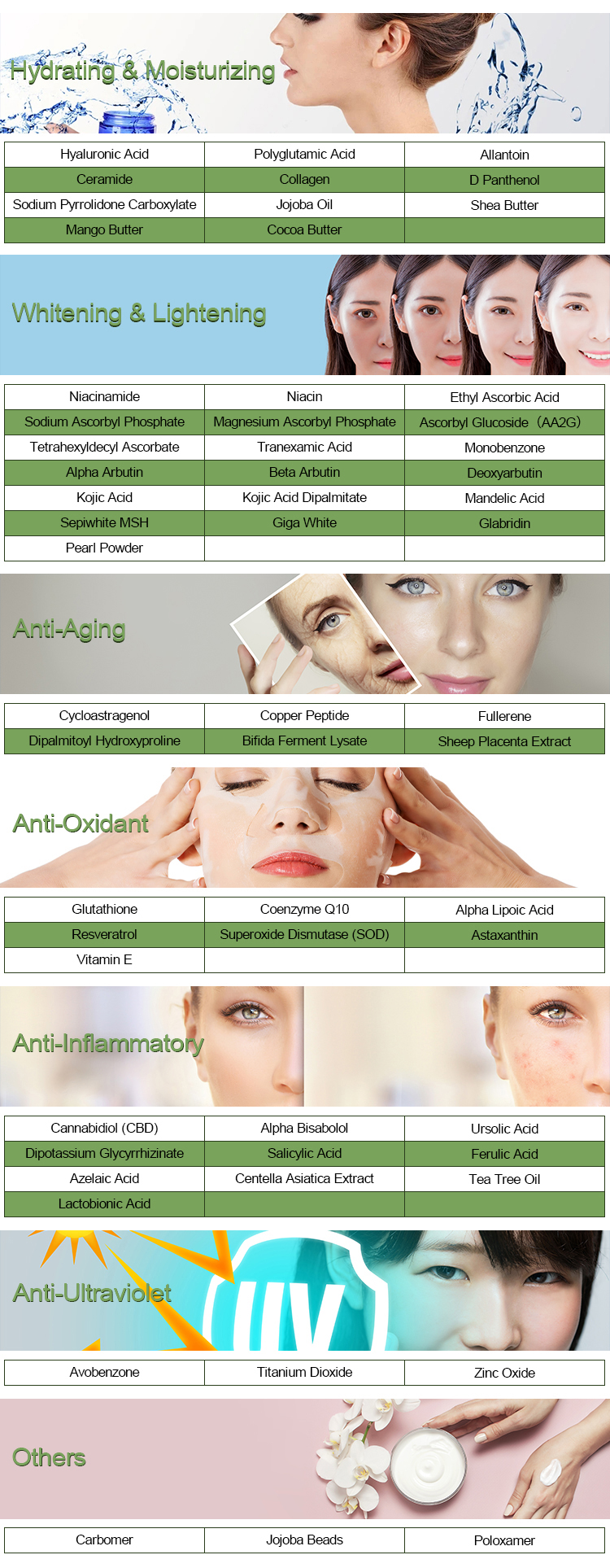Magnesium Ascorbyl Phosphate (MAP) is a water-soluble derivative of Vitamin C (ascorbic acid) commonly used in skincare and cosmetic products. It offers several benefits for the skin due to its antioxidant and collagen-boosting properties.
Applications of Magnesium Ascorbyl Phosphate:
Antioxidant Protection: Magnesium Ascorbyl Phosphate acts as an antioxidant, protecting the skin from free radical damage caused by UV radiation, pollution, and other environmental factors. This helps prevent premature aging, such as fine lines, wrinkles, and dark spots.
Brightening and Skin Tone Evening: It can help fade hyperpigmentation, including dark spots and age spots, by inhibiting melanin production. This results in a more even skin tone and a brighter complexion.
Collagen Production: Magnesium Ascorbyl Phosphate stimulates collagen synthesis, which is crucial for maintaining skin elasticity and firmness. As we age, collagen production decreases, leading to sagging skin. Magnesium Ascorbyl Phosphate helps combat this by promoting collagen production.
Reduction of Inflammation: It has anti-inflammatory properties, making it suitable for individuals with sensitive or irritated skin. It can help soothe and calm redness and inflammation.

Acne Control: Magnesium Ascorbyl Phosphate can also be beneficial for individuals with acne-prone skin. Its anti-inflammatory properties can reduce the redness and swelling associated with acne, and its ability to inhibit melanin production can help fade post-inflammatory hyperpigmentation (PIH) from acne scars.
Sun Damage Repair: Regular use of products containing Magnesium Ascorbyl Phosphate can assist in repairing damage caused by UV radiation. This includes reducing the appearance of sunspots and preventing further damage.
Hydration: While not as effective as some other forms of Vitamin C in terms of hydration, Magnesium Ascorbyl Phosphate can still contribute to the overall moisture content of the skin due to its ability to stimulate collagen production.
Stability: Magnesium Ascorbyl Phosphate is more stable than other forms of Vitamin C, such as L-ascorbic acid, which can be sensitive to light and air. This stability means that products containing Magnesium Ascorbyl Phosphate tend to have a longer shelf life.
It’s important to note that while Magnesium Ascorbyl Phosphate offers these benefits, the effectiveness of skincare products can vary depending on the concentration of Magnesium Ascorbyl Phosphate used, the formulation of the product, and individual skin types. For the best results, it’s often recommended to use skincare products consistently and as part of a broader skincare routine.
Additionally, if you have specific skin concerns or conditions, it’s a good idea to consult with a dermatologist or skincare professional for personalized recommendations and guidance on incorporating Magnesium Ascorbyl Phosphate into your skincare routine.
The negative impact of the Magnesium Ascorbyl Phosphate
Magnesium Ascorbyl Phosphate (MAP) is a stable derivative of vitamin C (ascorbic acid) that is commonly used in skincare products for its potential benefits to the skin. While it is generally considered safe and well-tolerated by most people, there can be some negative impacts or drawbacks associated with its use, especially in certain situations. Here are some potential negative impacts of Magnesium Ascorbyl Phosphate:
Skin Sensitivity: Like other forms of vitamin C, Magnesium Ascorbyl Phosphate can cause skin sensitivity, especially if used in high concentrations or if you have sensitive skin. Some people may experience redness, itching, or irritation after applying products containing Magnesium Ascorbyl Phosphate.
Allergic Reactions: Although allergic reactions to Magnesium Ascorbyl Phosphate are rare, they can occur in individuals who are sensitive or allergic to vitamin C or any of the other ingredients in the skincare product.
Incompatibility with Other Ingredients: Magnesium Ascorbyl Phosphate may not be compatible with certain other skincare ingredients. For example, it should not be used in combination with products containing niacinamide (a form of vitamin B3) at high concentrations, as they can potentially cancel out each other’s benefits. Always check product labels and consult with a dermatologist if you’re unsure about ingredient compatibility.
Product Stability: Magnesium Ascorbyl Phosphate can be sensitive to light and air, which can degrade its effectiveness over time. Ensure that you store your skincare products containing Magnesium Ascorbyl Phosphate in a cool, dark place and tightly seal the container to minimize exposure to air.
Limited Research: While vitamin C, in general, has been extensively studied for its skincare benefits, there may be less scientific research available specifically on the efficacy of Magnesium Ascorbyl Phosphate compared to other vitamin C derivatives. This means its effects and benefits may not be as well-documented.

Slow Results: Some users may find that the results of using Magnesium Ascorbyl Phosphate-based skincare products are slower to manifest compared to products with other forms of vitamin C, like L-ascorbic acid, which can provide more immediate results.
Cost: High-quality skincare products containing Magnesium Ascorbyl Phosphate can be relatively expensive compared to other skincare products without active ingredients.
It’s important to note that many people experience positive results from using skincare products containing Magnesium Ascorbyl Phosphate, such as improved skin tone, reduced hyperpigmentation, and enhanced collagen production. However, like any skincare ingredient, individual experiences may vary, and it’s essential to conduct a patch test and consult with a dermatologist if you have concerns about using products containing Magnesium Ascorbyl Phosphate, especially if you have sensitive skin or a history of allergic reactions. Always follow the manufacturer’s instructions for product use and monitor your skin for any adverse reactions.
